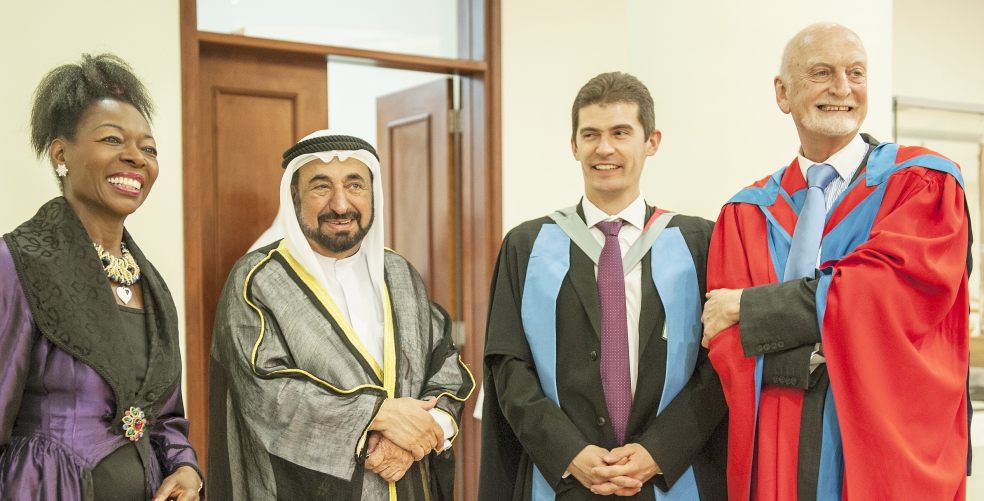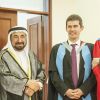
A myriad of praise for Middle East expert at Honorary Graduate ceremony
The University of Exeter has awarded an honorary degree to one of its most distinguished academics, Professor Tim Niblock, Emeritus Professor of Middle Eastern Politics. The ceremony was hosted by His Highness Dr Sheikh Sultan bin Mohamed Al Qasimi, in Sharjah UAE on 26 September.
The Honorary Doctor of Laws marks Professor Tim Niblock’s retirement from the Institute of Arab and Islamic Studies (IAIS) at the University, and his contribution to academia within the Gulf. Over 120 invited guests attended the special ceremony including IAIS alumni, many of whom hold influential positions across the Gulf region as well as members of the UAE ruling families, senior political figures and academic colleagues.
Professor Niblock‘s work on the politics of the Gulf has been influential since the 1980’s, with writings on Saudi Arabia, Iraq and the relationship between the Gulf and Asia. He has also written extensively on Sudan and Libya. His advice has been sought by government institutions in the UK and across Europe. Throughout his academic career Professor Niblock has expertly supervised a large number of successful PhD students, including many of the professors currently working in Middle East politics in the UK. This has helped to challenge and improve the understanding of Arab countries within the West. He is extraordinarily well connected within the Gulf region, with many of his former students working in government, key universities, ministries and organisations across the Middle East.
At the honorary graduation ceremony, Professor Gareth Stansfield, Director of the Institute of Arab and Islamic Studies and Al-Qasimi Professor of Gulf Studies gave the oration. He said: “Tim will undoubtedly stand out as one of the key figures in the development of modern Middle East Studies and political studies of the Middle East and Africa, not only in the UK, but in Europe and further afield. His impact in this area of research has been enormous, whether in those Universities that have been fortunate enough to have been his home, including Khartoum, Reading, Exeter, Durham and Exeter again – and those with which he has worked closely to develop academic study of the region.”
The input that Professor Niblock has put into developing world-class Middle East Studies centres has significantly helped the expansion of expertise in this field. In response to the oration Professor Niblock said: “Anything which I have achieved has been made possible by the emotional, practical and professional underpinning of those who have been around me – and by the environments in which I have lived and worked. Certainly my enthusiasm for the study of the region has always been fired by the constant questioning of assumptions and understandings, and the new perspectives and insights developed, through interactions with students.”
Professor Niblock began his career at the University of Khartoum, Sudan in 1969 where he became drawn to Arab Africa, learnt Arabic and met his wife Rida, a fellow academic. He nurtured both his family and career there, and as a result has strong ties with Sudan. An announcement was made during the honorary ceremony highlighting the Tim and Rida Niblock Scholarship Fund, designed to support and create opportunities for postgraduate students from Sudan, or for a Sudanese student domiciled in the UK or EU, to study at Exeter in the Institute of Arab and Islamic studies. This fund was created in the name of his wife Rida, who passed away in 2002.
The Institute of Arab and Islamic Studies is unlikely to have happened without the vision and determination of two people. His Highness Shaikh Dr Sultan bin Muhammad Al-Qasimi’s role in founding the Institute was critical, and Professor Tim Niblock, as the Founding Director of IAIS, was fundamental in turning the vision and concept into a reality. Together, they have endowed Exeter with a world leading Institute.
The honorary graduate ceremony presided over by the Vice Chancellor of the University of Exeter, Professor Sir Steve Smith and Chancellor Baroness Floella Benjamin OBE, also provided an opportunity to both recognise the outstanding career of Professor Niblock and enhance the University’s continuing relationship with His Highness and other senior alumni across the Gulf states.
Professor Niblock finished his response by sharing his deeply held optimism about the region. He said:”The current disarray across sections of the Arab world are alarming and distressing, but I retain the belief that Arab populations have the ability now to create a better future for themselves and they will do so. Hopefully without external interference.”
Following the official ceremony, His Highness Sheikh Dr. Sultan Al-Qasimi thanked Professor Niblock for his excellent leadership of the IAIS at Exeter as professor and director for many years.




















